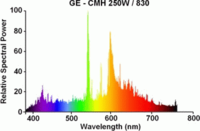
Photo from wikipedia
Abstract This study presents a new methodology to solve thermal radiation in participating gases, the spectrally reduced integration (SRI), which employs a non-uniform spectral discretization to considerably reduce the computational… Click to show full abstract
Abstract This study presents a new methodology to solve thermal radiation in participating gases, the spectrally reduced integration (SRI), which employs a non-uniform spectral discretization to considerably reduce the computational cost of the line-by-line (LBL) solution while still maintaining good levels of accuracy. This non-uniform spectral mesh is generated from discretization schemes based on the spectral contributions of the bands, which apply less or more refined spectral resolution depending on the importance of the bands to the radiative transfer. Based on this methodology, several schemes were initially proposed and evaluated for a homogeneous H2O-CO2 mixture test case. Results showed that the most refined schemes were able to generate highly accurate results three to five times faster than the reference LBL solution, while the coarser schemes were still interesting alternatives for faster but still reliable calculations. In fact, a compromise between the accuracy of the SRI solution and the total number of spectral intervals was observed in all the tested schemes. The SRI method also presented similarly promising results when solving non-homogeneous test cases. Finally, the present study also develops two alternatives to address the need of a priori evaluation of the spectral contributions of the bands when using the discretization schemes. These two methodologies produced surprisingly accurate solutions of the non-homogeneous test cases, each with its own advantages and disadvantages, and could be applied together to further simplify the use of the SRI in highly accurate coupled combustion problems.
Journal Title: International Journal of Heat and Mass Transfer
Year Published: 2021
Link to full text (if available)
Share on Social Media: Sign Up to like & get
recommendations!